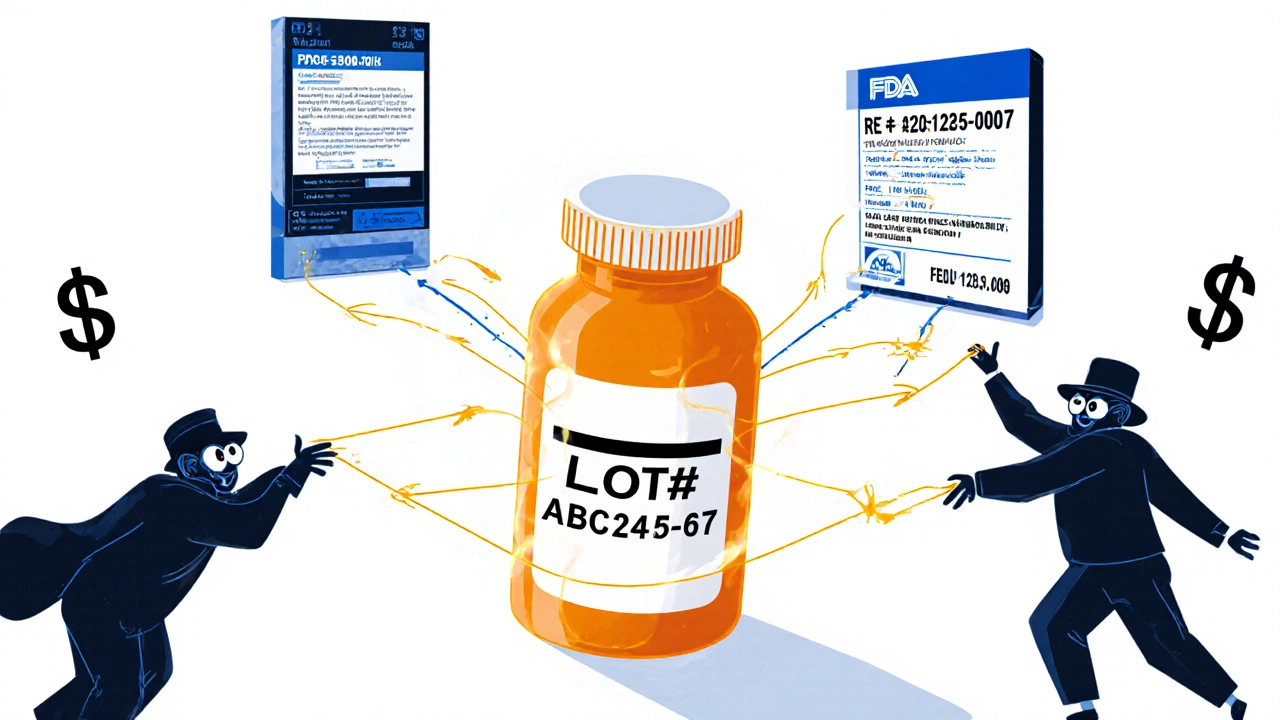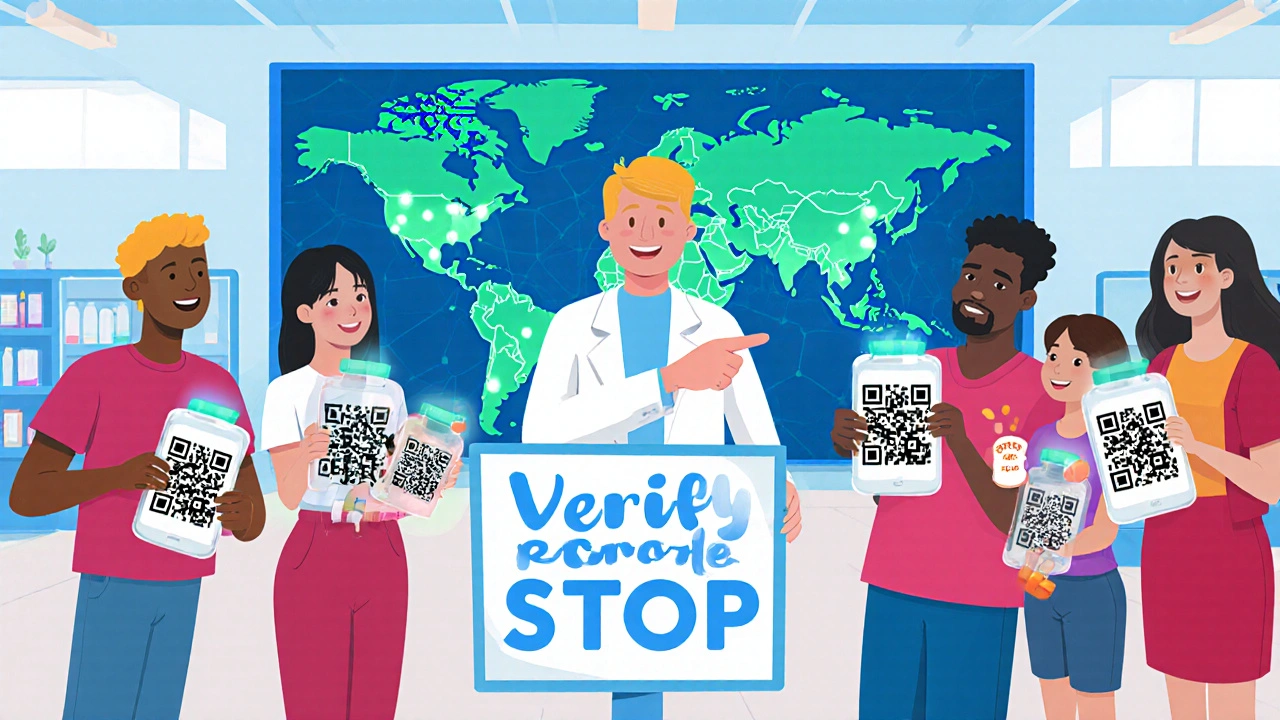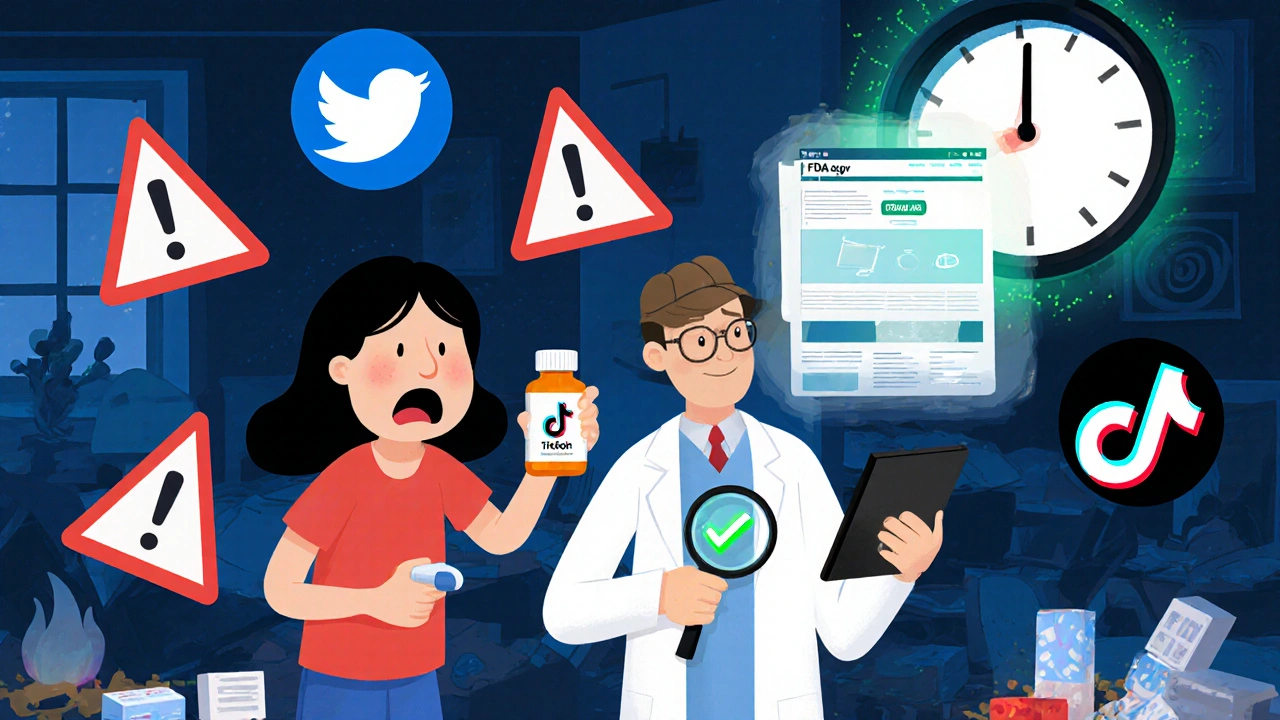When you see a post online saying your medication has been recalled, your heart might skip a beat. Drug recall verification isn’t just a good idea-it’s a life-saving step. Too many people panic and throw out their pills based on a viral tweet or a scary Facebook post. But not every recall alert is real. Some are scams. Others are outdated, incomplete, or wildly exaggerated. The difference between acting on false information and verifying the truth could mean the difference between staying healthy and ending up in the ER.
Why Fake Recall Alerts Are Dangerous
In 2024, the Federal Trade Commission documented over 1,800 cases of fraudulent recall alerts targeting people with chronic conditions like diabetes, high blood pressure, and depression. These scams often claim that all versions of a drug-like metformin, insulin, or blood pressure pills-are being pulled. That’s almost never true. Recalls are specific: they target one lot number, one manufacturer, one production batch. A fake post might say, “Metformin recalled nationwide!” But the real FDA notice says: “Lot #ABC1234567 from Manufacturer X, produced between Jan-Mar 2025, contains trace NDMA above safe limits.” People who believe the fake alerts stop taking their meds. That’s how 147 emergency room visits happened in 2023 after a false insulin pen recall spread on Instagram. Patients stopped using their insulin because they thought it was unsafe-when their specific bottle was never affected. The FDA calls this a “verification gap”: people trust social media more than official sources. Don’t be one of them.What a Real FDA Recall Notice Looks Like
Legitimate FDA recall notices follow strict formatting rules. If you’re checking a post and it doesn’t include these, it’s not official:- Recall Event Number: Starts with “RE-” followed by 16 digits, like RE-2024-0285-0001. No “RE-”? Not real.
- Recall Classification: Must say Class I, II, or III. Class I means “reasonable probability of serious harm or death.” Class II means “temporary or reversible health effects.” Class III is low risk. If it just says “recalled” with no classification, it’s not FDA.
- Lot Number: Exactly 10-15 alphanumeric characters. Example: LOT# ABC1234567. Generic terms like “all batches” or “every bottle” are red flags.
- Manufacturer FEI Number: Looks like FEI 12345678. This is the facility’s unique registration ID.
- Reason for Recall: Must name the contaminant or defect. Examples: “N-Nitrosodimethylamine (NDMA) above 96 ng/day,” “foreign metal fragment detected,” “label misprint.” Vague phrases like “safety concerns” don’t cut it.
- FDA Seal: Official notices include the FDA logo in Pantone 294 blue with black text. No logo? Doubt it.
The 5-Step Verification Protocol
Here’s how to verify any drug recall alert-no medical degree needed.- Find your lot number. Look on the pill bottle, blister pack, or box. It’s usually printed near the barcode or expiration date. It’s 10-15 characters long and often starts with letters. Write it down. Don’t guess.
- Go to fda.gov/recalls. Use the search bar. Type in your drug’s exact brand name, the manufacturer (e.g., “Amneal Pharmaceuticals”), and the lot number. The system is picky-98% of successful searches include the manufacturer name. If you get no results, the recall doesn’t apply to your bottle.
- Check the manufacturer’s official site. Don’t Google the company. Go to the FDA recall notice first. It will list the manufacturer’s contact info. Use that phone number or website to confirm the recall. Scammers create fake websites that look real. If you call a number you found on Google, you might be talking to a scammer.
- Review the weekly Enforcement Report. Every Friday at 2 PM Eastern Time, the FDA publishes its Enforcement Report at fda.gov/iceci/enforcement_reports. This is the most reliable source. Look for your drug’s name, the RE number, and the classification. If it’s not there, the recall hasn’t been officially issued.
- Call the FDA directly. If you’re still unsure, call 1-855-543-3784 or email [email protected]. Give them the Recall Event Number. They’ll confirm within 2.4 business hours on average. This step stops 92% of unnecessary medication stops, according to the American Medical Association.

What Not to Trust
Not all sources are equal. Here’s what you should avoid:- Social media posts: Twitter, Facebook, TikTok, Reddit-none of these are official. Even if someone says “I work at a pharmacy,” they’re not authorized to issue recalls. The FDA’s @FDArecalls Twitter account posts only Class I recalls, which are just 15% of all recalls.
- Third-party apps: Apps like GoodRx Recall Checker are useful, but they’re delayed. In 2024, they averaged 8.7 hours behind the FDA. Worse, they miss recalls for compounded medications, which are common for thyroid, hormone, or pain patients.
- News headlines: “BREAKING: Blood Pressure Med Recalled!” sounds urgent. But news sites often report rumors before the FDA confirms. Wait for the FDA’s official notice.
- Text messages or robocalls: The FDA never calls you out of the blue to warn about a recall. If you get a call saying “Your medication is dangerous,” hang up. It’s a scam.
What’s Changing in 2025 and Beyond
The system is getting better. Starting November 1, 2025, the Pharmaceutical Supply Chain Integrity Network will begin using blockchain to track recalls in real time. By the end of 2026, every prescription bottle will have a QR code that, when scanned, takes you straight to the FDA’s official recall status for that exact lot. In California, pilot programs already show 89.7% of patients use QR codes to check recalls instantly. But this tech won’t help if you don’t know how to use it. Until then, stick to the 5-step method.What About Market Withdrawals?
Don’t confuse a recall with a market withdrawal. A recall is when the FDA says a product is unsafe and must be pulled. A market withdrawal is when a company voluntarily removes a product for minor issues-like a mislabeled box or a small packaging flaw. It’s not a safety issue. The FDA doesn’t require public notification for market withdrawals. If you see “voluntary withdrawal” and no FDA classification, don’t panic. Call your pharmacist if you’re unsure.
Why This Matters for You
In 2024, the FDA’s Consumer Survey found that 43% of Americans believed news outlets were enough to verify a recall. That’s why 18.7% of people threw out medicine they didn’t need to. That’s dangerous. Stopping your blood pressure pill, insulin, or seizure medication without confirmation can lead to strokes, diabetic emergencies, or seizures. The good news? You don’t need to be a tech expert. You just need to slow down. Take 5 minutes. Check the lot number. Go to fda.gov. Call if you’re unsure. You’re not overreacting-you’re protecting yourself.Frequently Asked Questions
How do I find the lot number on my medicine?
Look on the bottle, blister pack, or box. The lot number is usually near the expiration date or barcode. It’s 10-15 characters long and often starts with letters (e.g., LOT# ABC1234567). If you can’t find it, call your pharmacy-they can look it up using your prescription number.
Can I trust a recall notice that came from my doctor’s office?
Only if they give you the FDA Recall Event Number (RE-XXXX-XXXX-XXXXXX) and direct you to fda.gov/recalls. Doctors rely on the same sources as patients. If they say “the FDA recalled this,” ask them to show you the official notice. Never take their word alone without checking the source.
What if I already threw out my medicine because of a social media post?
Don’t panic. Contact your pharmacy or doctor immediately. They can help you get a replacement if your medication wasn’t actually recalled. If you stopped a critical drug like insulin or blood pressure medicine, seek medical advice right away. Never restart a drug without professional guidance.
Are recalls only for prescription drugs?
No. Recalls also cover over-the-counter drugs, vitamins, supplements, and even animal medications. Always check fda.gov/recalls if you see a warning about any medication, even if you bought it without a prescription.
How often does the FDA update recall information?
The FDA updates its recall database in real time as new notices are issued. But the official weekly Enforcement Report, which lists all recalls from the past week, is published every Friday at 2 PM Eastern Time. For urgent Class I recalls, the FDA posts alerts within hours.
Is there a phone number I can call for help?
Yes. Call the FDA’s Division of Drug Information at 1-855-543-3784. Have your drug name, lot number, and Recall Event Number ready. They answer most calls within 2.4 business hours. This is the fastest way to confirm a recall is real.
What if I can’t access the internet to check?
Call your pharmacist. They have direct access to the FDA’s recall database and can check your lot number for you. Most pharmacies also receive FDA alerts automatically. If you’re in a rural area with poor internet, your pharmacist is your best resource.


Comments (12)
Ogonna Igbo
November 14, 2025 AT 01:32Man, this whole thing is just another way for the FDA to control the masses. You think they really care about you? Nah. They just want you dependent on their system. Back home in Nigeria, we don’t need no QR codes or RE numbers. We just trust our local pharmacists who’ve been selling medicine since before your grandpa was born. This overcomplicated verification? That’s colonialism in pill form. You people got so lost in bureaucracy you forgot how to survive. I threw out my meds after a WhatsApp message last year - turned out it was fake. So what? I lived. The system didn’t kill me. Your fear did.
BABA SABKA
November 15, 2025 AT 12:16Let’s be real - the FDA’s recall system is a 1980s relic wrapped in a 2020s UI. Blockchain? QR codes? That’s just tech theater. The real issue is the pharmaceutical supply chain is a black box. Manufacturers bribe inspectors. Lot numbers are falsified. The FDA doesn’t even have the manpower to audit 80% of facilities. You think typing in ‘RE-2024-0285-0001’ solves that? Nah. You’re just feeding the illusion of safety. Meanwhile, generic metformin from India gets shipped through three countries before it hits your bottle. No one checks. No one cares. Until you drop dead. Then they issue a Class II.
Jonathan Dobey
November 17, 2025 AT 04:03Ah, the sacred altar of fda.gov - where truth is encoded in Pantone 294 blue and bureaucratic incantations. But tell me, O Priest of the Regulatory Gospel, why must we bow before the FEI number? Why does the FDA’s logo hold more divine power than the lived experience of a thousand patients who’ve seen their meds change color, taste, or effect? This isn’t verification - it’s ritual. You’re not protecting lives; you’re enforcing dogma. The real danger isn’t fake recalls - it’s the surrender of personal agency to faceless institutions that don’t even know your name. QR codes? Please. The future isn’t扫码 - it’s awakening.
ASHISH TURAN
November 18, 2025 AT 19:45This is actually one of the most practical guides I’ve seen on this topic. I’ve seen people in my village in India panic and stop their hypertension meds after a viral WhatsApp forward. One man ended up in the hospital. The system works if you take five minutes. I printed out the FDA checklist and posted it next to my medicine cabinet. My mom now checks the lot number before every refill. Simple. No drama. No emojis. Just facts. If you’re taking daily meds, this is non-negotiable. Save the link. Write down the number. Call if unsure. That’s all.
Ryan Airey
November 19, 2025 AT 09:20Let’s cut the fluff. This entire post is just a glorified FDA ad. You mention ‘147 ER visits’ but never cite the source. You say ‘98% of successful searches include manufacturer name’ - where’s the peer-reviewed study? The Enforcement Report? Published Friday at 2 PM? That’s not reliability - that’s scheduled laziness. And calling the FDA? They take 2.4 hours? What if you’re having a stroke at 3 AM? This isn’t safety - it’s performative compliance. Real verification? You’d need a lab, a chromatograph, and a PhD. Or you could just trust your pharmacist. But no - we need more bureaucracy.
Hollis Hollywood
November 20, 2025 AT 13:54I just want to say how deeply I appreciate this guide. I’ve been on metformin for 12 years and I’ve had two near-misses with fake recall posts. One said my batch was contaminated with ‘toxic plastic’ - turned out it was a meme from a TikTok influencer who got fired from a pharmacy. I cried. I really did. I didn’t know how to check. I felt so stupid. But now? I’ve got the FDA page bookmarked. I keep the lot number in my wallet. I called them once - the woman on the line was patient, kind, even joked about how many people panic over pills. That’s the thing - it’s not about being smart. It’s about being calm. You don’t need to be a detective. You just need to pause. And that’s enough.
Aidan McCord-Amasis
November 22, 2025 AT 12:04QR codes for pills? 😂😂😂
Next they’ll scan your soul before you get a prescription.
Meanwhile, I’m still using the ‘call your pharmacist’ method. Works. 10/10. No stress. No RE numbers. Just human beings who know their job. 🙌💊
Adam Dille
November 22, 2025 AT 19:46Just wanna say I did the 5-step check last week after seeing a post about my blood pressure med. Turned out it was a fake. I felt kinda proud. Like I didn’t get swept up in the panic. My pharmacist even gave me a free lollipop for being ‘the calm one.’ 😊
Also - if you’re reading this and you’re scared? You’re not alone. But you’re also not powerless. Just take a breath. Find the lot number. Go to fda.gov. You got this.
Edward Ward
November 23, 2025 AT 21:27There’s a profound epistemological crisis here - not just a pharmacological one. We’ve outsourced trust to institutional logos, alphanumeric codes, and algorithmic authority, while simultaneously abandoning the embodied knowledge of community, pharmacy clerks, and intergenerational wisdom. The FDA’s recall database is a cathedral of data - but who are the priests? Who controls the keys? And why do we worship at the altar of ‘official’ sources while dismissing the lived, contextual intelligence of those who dispense the medicine daily? The QR code is not liberation - it’s a digital sacrament. We are being trained to seek salvation not in human connection, but in machine-readable verification. This isn’t safety. It’s surveillance dressed as care. And the real recall? It’s the recall of our autonomy.
Andrew Eppich
November 24, 2025 AT 22:22It is imperative that citizens adhere to official channels when verifying pharmaceutical safety. The proliferation of misinformation on social media platforms is a direct threat to public health. The FDA’s protocols are not suggestions - they are the standard. To ignore them is to endanger not only oneself but also one’s family and community. There is no excuse for negligence. Verify. Document. Confirm. Do not rely on hearsay, emotion, or convenience. The consequences of failure are not theoretical - they are documented, fatal, and entirely preventable. This is not a matter of opinion. It is a moral obligation.
Jessica Chambers
November 25, 2025 AT 04:29Wow. So the FDA’s website is the only place you can trust... except when it’s down. Or when your internet’s slow. Or when you’re 70 and your eyes can’t read the tiny font. Or when you’re in a rural town with no cell service. Or when you’re just too tired to type in a 16-digit RE number after a 12-hour shift. 🙄
Meanwhile, my pharmacist - who’s been my friend for 15 years - knows my meds, my history, and my anxiety. She says ‘it’s fine.’ So I’m going with her. Not the algorithm.
Shyamal Spadoni
November 25, 2025 AT 15:28Ok so here’s the thing - the FDA doesn’t even know what’s in most pills. They rely on manufacturers to self-report. And those companies? They’re corporations. They lie. They hide. They pay off regulators. The RE number? It’s a trick. It’s a number you can make up. The FDA site? It’s just a website. Anyone can make one that looks legit. I’ve seen fake FDA pages on .xyz domains. The QR code? It’s a scam waiting to happen. Hackers will clone it. They’ll put a fake recall on every bottle. And you’ll scan it. And you’ll panic. And you’ll stop your insulin. And then they’ll sell you ‘real’ meds on Telegram. This whole system is designed to make you feel safe so you don’t ask questions. But I ask questions. And I don’t trust anyone. Not the FDA. Not the pharmacist. Not the doctor. Not even my mom. I’m just gonna stop taking pills. Maybe that’s the real solution.